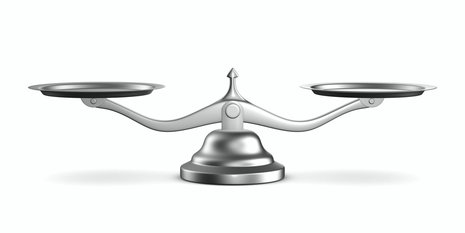You should always be honest, right? You should always stay true to who you are and what you believe, and let out whatever reality is boiling inside of you–even if it’s hurtful, or destructive, or makes the person listening to you hate their stupid face.
Unless it’s not necessary, then what the hell is wrong with you? You’re just being a dick for no reason? Why? Who does that? What happened to you as a child?
We see honesty as this unquestioned virtue–that it’s always the right policy regardless of any context you can possibly dream of. This is why certain assholes feel they can justify any level of dickishness with, “I’m just being honest.” We assume that this catch-all makes any assholeish but true statement not only justified to express, but noble.
When we view things this way, that’s when we end up telling people with differing beliefs, “You’re a fucktard Nazi,” or fat people, “I am grossed out by you,” or your Uber driver, “dude you kind of smell like pee.”
If honesty is always the right thing to express, then you can say all of that, and justify it with, “I’m just being honest.”
Chances are you have at least a couple, “I’m just being honest” people in your life, and chances are, everyone you know fucking hates them. They’re the guy who brings up politics at a party and makes shit weird, or the judgmental distant relative, or the monster of a 13-year-old girl who tells another girl “You can’t pull off that skirt with your fat legs. I’m just being honest.”
Besides being awful, there’s another problem here: what these people are expressing often isn’t even real honesty.
I mean how many times have you wanted to respond to somebody else’s argument with, “Well, aren’t you a fucking idiot?” For me, the answer to that is, “Thousands of times…per year.”
That’s fully and completely my truth in that moment. Staying silent, or saying anything but “You’re an idiot,” is on some level, a lie on my part.
But expressing my truth in that situation is fucking dumb. It pisses people off, convinces no one of anything, and by the way, is often wrong.
Our “honest feelings” about things are often totally misguided. They’re just gut reactions we have, and when we actually think and evaluate those feelings, our conclusion always changes to some degree–which means that that “honest feeling” you have is really fucking worthless.
Real honesty–effective honesty–is listening to our gut and then asking it why. It’s pondering the circumstance, weighing pluses and minuses, and proceeding with a coherent thought.
And don’t get me wrong–sometimes real honesty is important to express. Sometimes the importance of a truth totally vanquishes everything else. Sometimes someone will embarrass themselves if you don’t tell them their graduation speech sucks, or that their breath smells like ass, or that their dreams are terrible and they will fail at them, and maybe they should reevaluate themselves for having such stupid ideas.
You’re obligated to be honest in those situations.
But sometimes truth just isn’t important. 13-year-old girls don’t need to know you think they’re fat. Your blind date doesn’t need to know that you find them totally boring. Your friend doesn’t need to know that you think their tattoo looks like an elephant taking a dump on the word “Love.” It’s already on their body. What exactly are you accomplishing with that?
In this respect, lying isn’t always bad. Sometimes (but not always) it’s better to have a smooth family gathering than it is to call your grandma Hitler.
So maybe we should stop loving honesty so unconditionally.
The Other Side of Honesty
Now, that’s not to say there isn’t another extreme on this spectrum, because there is, and it sucks just as much.
Mothers who overly prioritize a peaceful home, guilty white people, and college students are among the leaders in the industry of creating a comfortable, conflict-free environment regardless of fucking everything else. These environments are where honesty goes to die. You can’t bring up what you think is a good idea if it bums anyone out in these environments, which just means a grocery list fully of shitty results:
1) Some people aren’t bringing up perfectly good ideas because they’re afraid of them being misconstrued.
2) Some people aren’t bringing up shitty ideas to others and instead reaffirming said shitty ideas in their head or on their white power message boards, thus guaranteeing their head will always be full of only shitty ideas.
3) Some people aren’t hearing other people’s shitty ideas, so they think the rest of the world only has good ideas, everything is fine, and there’s no way a noxious tangerine will be elected leader of the free world.
4) No one gets to practice talking to each other about things they disagree with, and as a result, we lash the fuck out every time we do disagree.
5) No one hears the good ideas buried within the shitty ideas.
6) No one hears the good intentions of shitty ideas, so they continue to assume that everybody that has them is essentially Hitler, ISIS, and Nancy Grace.
This goes so far beyond racists expressing their casual final solutions. This type of cowardly dishonesty comes up constantly in conversations about everything from politics, to your nephew’s life choices, to someone casually bringing up your tendency to say “fusstrating.” The opportunity to be honest at important moments is constantly passed up by so, so many of us in the name of sparing feelings, and it has to stop.
We have to find this balance between being assholes, and being cowards, and this includes how we talk to ourselves.
When to Be Honest With Yourself
Crying and saying, “I’m ugly! I’m worthless! I’ll never find love!” is maybe not super productive. Don’t be honest with yourself if that’s how you’re going to take it.
Instead, choose your moments, because looking in the mirror during a moment of relative calm, and saying, “Okay. So I’m ugly. What can I do about this? How can I be as successful as possible–both in life and love–in spite of my terrible, terrible face?” is a positive interaction to have with yourself.
It’s good to accept truths about yourself–no matter how awful they are–as long as you can accept them without falling into a hate spiral.
This should also be how you evaluate speaking your truth to other people.
The pertinent question with all interactions isn’t about merely whether or not something is true, but rather about the impact of expressing that truth.
So in order to decipher that, we must ask ourselves two very simple questions:
1) What would expressing this truth accomplish?
2) Is that worth the butthurtness is might create?
That’s it. That’s the whole deal. What will it do, and how hurt will their butt be?
The answers here will vary from person to person, and you’ll likely fuck up sometimes, but as long as it leaves you somewhere between basic honesty and not being an, “I’m just be honest” asshole, you should be all right.
When we have a chance to speak up in a way that we think is going to improve the world, and we avoid that, we’re cowards.
When we are just ambivalent, or prejudiced, and outwardly mean to people, we’re assholes. Neither is ideal.
Let’s try to find a middle ground, because the middle ground is that magical place where we can have our cake and lie about eating it too. You can be courageous and kind. You can be real and sensitive. You can tell it like it is, and not be a total douche.
Believe me. I would never lie to you.









